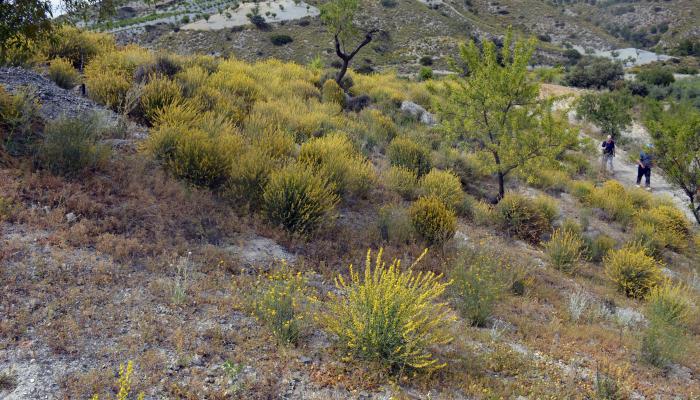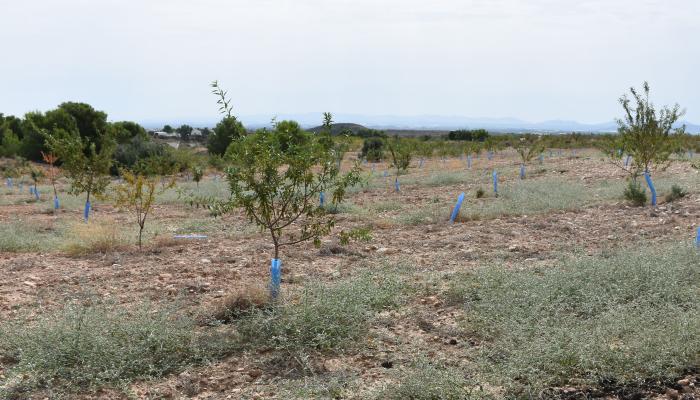
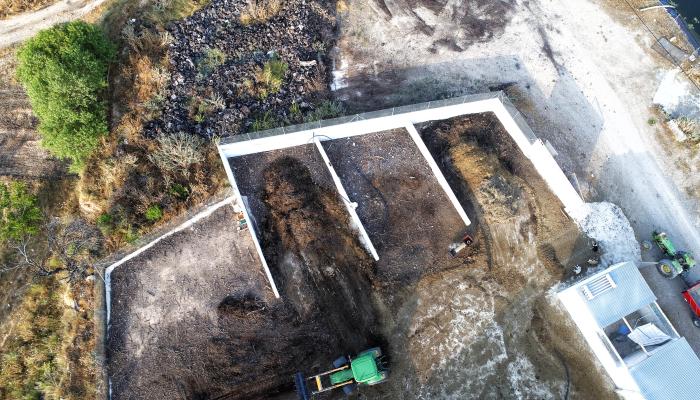
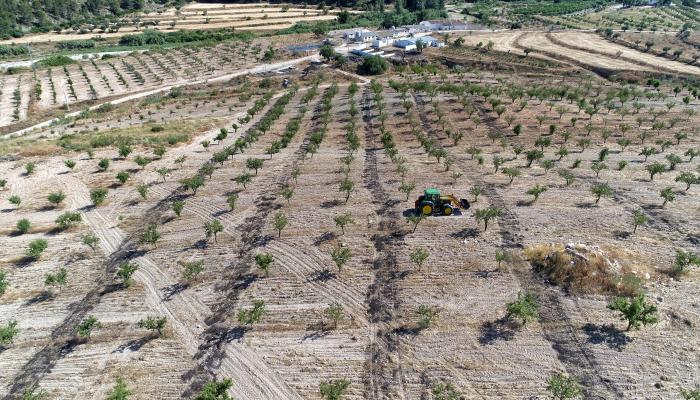
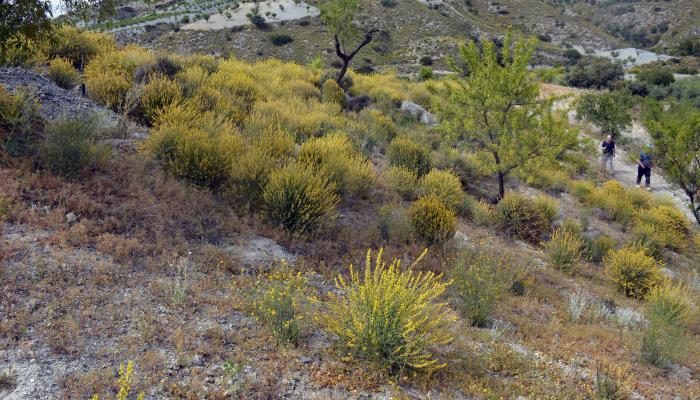
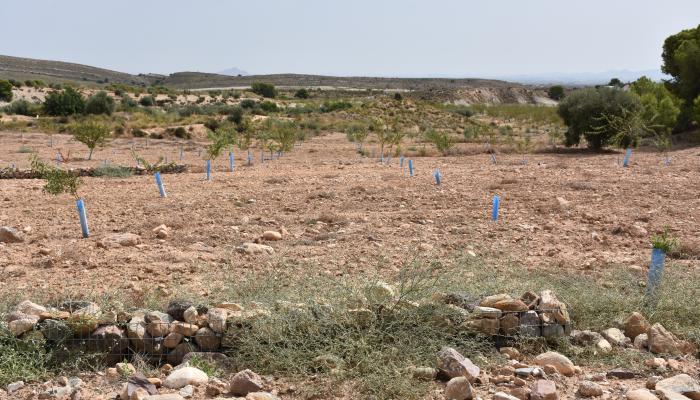
profundidad de variedades de almendro de floración tardía, la plantación de especies autóctonas adaptadas al cambio climático entre las líneas de cultivo y el uso de abonos verdes y compostaje de residuos vegetales para contribuir al incremento del carbono en los
suelos.
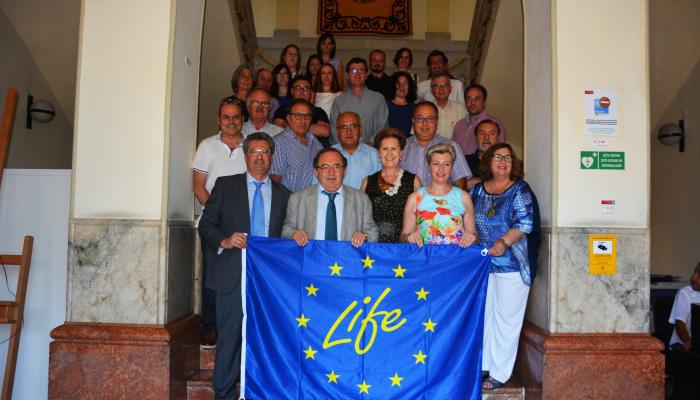
sus efectos, así como la pujanza de los grupos de investigación de la Universidad de Murcia y la trascendencia que el Proyecto tiene para la Región de Murcia.
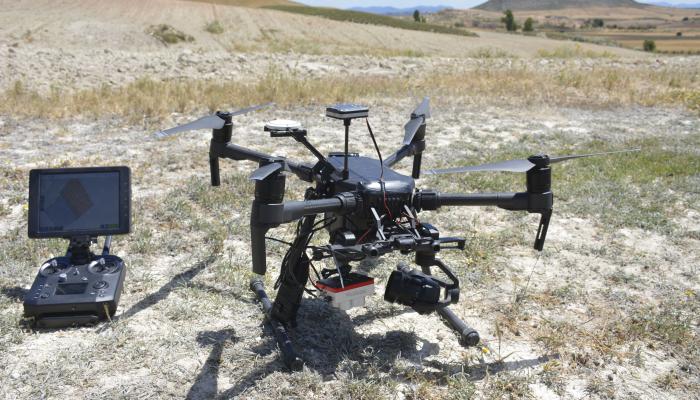
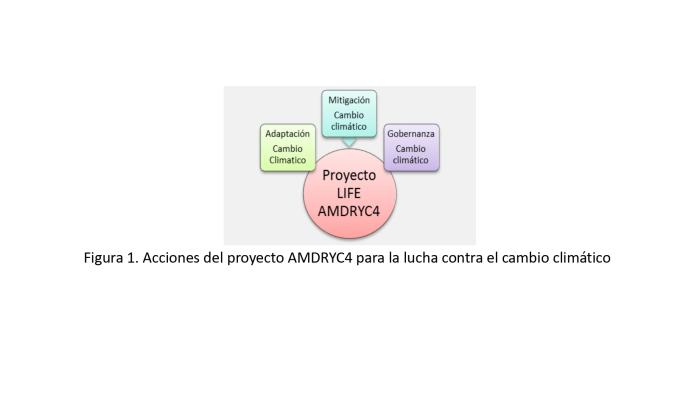
proyecto plantea la actuación en dicho ámbito rural desde diferentes perspectivas basadas principalmente en diferentes acciones para la adaptación, mitigación y gobernanza, resaltando el desarrollo sostenible (con aplicación de medidas de Adaptación basada en Ecosistemas - AbE), la custodia agraria y los servicios ecosistémicos, el desarrollo económico local (con implicación de administraciones locales y sociedades civiles) y la colaboración y puesta en marcha de proyectos de actuación como la iniciativa 4‰.

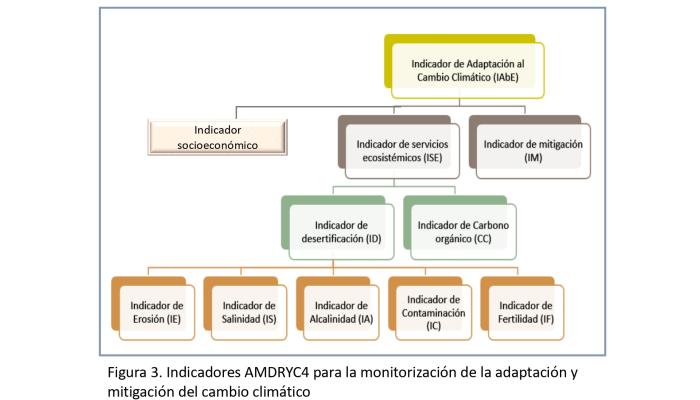
Climate change is not solely an environmental phenomenon but has profound economic and social consequences. This creates the need to implement projects such as LIFE AMDRYC4, whose main objective is to promote and enhance the climate resilience of rainfed agriculture in Mediterranean areas and its sustainable, intelligent, and integrated management. This serves as a fundamental tool for ecosystem-based adaptation to climate change and for strengthening its mitigating role as carbon sinks, ensuring that these systems remain sustainable and persistent.
This project adopts an innovative approach, aligning efforts to improve the adaptive capacity of agricultural systems in the face of rising temperatures and decreasing precipitation—key features of climate change.
AMDRYC4 is a demonstration project that simultaneously assesses, through measurable projects, both carbon capture to offset emissions and the ecosystem services provided by agricultural holdings. In addition, it aims to transfer knowledge and adaptive practices to farmers in the region to increase their land's long-term productivity and sustainability.
Soil degradation threatens more than 40% of the Earth’s surface, and climate change accelerates this process, endangering food security.
Climate change predictions warn of the potential disappearance of Mediterranean rainfed agriculture, with severe consequences such as the loss of arable land, desertification, migration, and famine.
The project addresses this situation as an urgent challenge for action in the Mediterranean rural agricultural landscape, which is highly threatened in this regard. It approaches the issue from different perspectives, mainly based on adaptation, mitigation, and governance actions, highlighting:
- Sustainable development through the application of Ecosystem-based Adaptation (EbA) measures
- Agrarian stewardship and ecosystem services
- Local economic development with the involvement of local governments and civil society
- The initiative, collaboration, and implementation of action projects such as the4‰ initiative
Furthermore, the project is founded on principles aligned with the Sustainable Development Goals and various European strategies.
In recent years, Ecosystem-based Adaptation (EbA) has gained great importance, as it links traditional approaches to biodiversity and ecosystem conservation with sustainable socioeconomic development.
Ecosystem-based adaptation offers numerous benefits, such as:
- Improvement of biodiversity
- Rural development and settlement
- Transition from traditional techniques and practices to more sustainable alternatives
- Contribution to mitigating the effects of climate change
At the agricultural level, EbA is also relevant in the search for responses to the effects of climate change, in order to help farmers, particularly those in rainfed systems, to minimize the effects caused by extreme events.
Among these actions are experiences that integrate the addition of Km 0 compost or green manuring, which is a practice with multiple ecosystem, economic, and management benefits for farmers, since it increases the content of organic matter and nutrients in the soil (especially nitrogen through the biological fixation carried out by legumes), increases biodiversity, maintains high water infiltration rates due to the combined effect of the root system and plant cover, reduces soil water evaporation, protects against surface erosion, decreases nutrient leaching, improves soil structure, prevents weed development, minimizes attacks by specific pests and diseases, and is also economical and easy to implement by farmers.
Among the actions mentioned, the project collaborates with other studies and initiatives such as the so-called “4‰ initiative”, launched by France during COP 21 in December 2015, whose objective is to bring together all voluntary actors from the public and private sectors in the fields of agriculture, forestry, gardening, and landscape management…, for their active commitment in the transition towards a productive, highly resilient agriculture based on adapted land and soil management, generating employment and income, and involved in sustainable development.
The initiative seeks to increase the amount of organic matter in soils and carbon sequestration through agricultural practices adapted to each area's local, environmental, social, and economic conditions, thus promoting the circular economy associated with agricultural organic waste.
The main objective of the proposal is to promote and enhance climate resilience in rainfed agriculture in Mediterranean areas and its sustainable, smart, and integrated management as a fundamental tool for ecosystem-based adaptation (EbA) to climate change. It also aims to strengthen its mitigating role as a carbon sink so that these systems remain sustainable and persistent.
Ecosystem-based Adaptation (EbA) is defined as using biodiversity and ecosystem services as part of a broader adaptation strategy. Its purpose is to maintain and increase resilience and reduce the vulnerability of ecosystems and people to the impacts of climate change.
This general objective is broken down into several specific goals:
- Implement adaptive solutions, using soft technologies and sustainable measures aimed at ecosystem-based adaptation (EbA) to climate change.
- Develop monitoring and control methodologies for potential transformative impacts on carbon sequestration (4‰ initiative), ecosystem services, and the fight against desertification of Mediterranean soils through the quantification and evaluation of indicators.
- Contribute to the knowledge and appreciation of these agricultural systems, with modeling of organic carbon and EbA ecosystem services, and mitigation through cost/benefit analysis.
- Encourage the transferability and replicability of actions through stakeholder participation via voluntary agreements with farmers, and the launch and management of the Agrarian Custody for Climate Association (ACAC).
- Promote sustainable development through the improvement of rainfed agricultural soils to support population retention in rural areas, green and circular economy, and rural employment generation.
- Contribute to governance with financial instruments and proposals to ensure the sustainability of the work once the project ends.
Additionally, the aim is to inform and encourage stakeholders involved in the sustainability of rainfed agricultural systems to change attitudes and business culture toward a low-carbon economy and the widespread adoption of EbA practices.
The LIFE AMDRYC4 project is being carried out in the Region of Murcia (Spain), as a geographic area representative of the Mediterranean region, with actions implemented in four experimental plots located in different parts of the region:
- El Moralejo (Caravaca de la Cruz)
- Xiquena (Lorca)
- Nogalte (Lorca)
- Corvera (Murcia)
In these plots, various actions are being developed from the perspective of Ecosystem-based Adaptation (EbA), whose ultimate goal is to implement organic agriculture in rainfed crops using conservation agricultural practices.
The experimental plot in Corvera is dedicated to rainfed almond, olive, and carob tree cultivation, while the plot in Nogalte is used for almond cultivation. In both, actions are being taken to improve biodiversity by creating diversified and heterogeneous ecosystems that promote colonisation by new species and help prevent erosion, desertification, and improve water retention.
In the Xiquena plot, the focus is on managing animal by-products (manure and slurry) from nearby local livestock farms, along with sewage sludge that helps to provide consistency and solids to the mix.
In the El Moralejo plot, rainfed cereal crops are grown, supported by compost produced from the mixtures created in Xiquena.
Ultimately, these actions incorporate compost and/or green manure into the crops, along with increased biodiversity, among other elements—traditional practices widely used in the Mediterranean basin but sidelined for much of the past century.
Green manure involves the organic enrichment of the soil through the rotation, succession, and association of commercial crops with alternative species such as legumes, grasses, cruciferous plants, or Caryophyllaceae. This practice is developed alongside the introduction of natural vegetation species next to the crops, which promotes the biodiversity of each agricultural zone.
All of this, together with efficient resource use and an appropriate governance system, will make it possible to restore, enrich, and improve the biological, physical, and nutritional conditions of the soil, helping to maintain and increase the resilience of crops to climate change and reduce the vulnerability of these Mediterranean rainfed productive ecosystems.
In any case, the organic matter to be added will be sourced from geographically nearby areas, whether of animal or plant origin, composted if possible, or crushed—thus promoting the circular economy of rural areas.
As a result of the increase in organic matter, the 4‰ initiative will be fulfilled, contributing to climate change mitigation and, at the same time, providing clearly more favorable ecosystem services.
All these actions will lead to the recognition of soil as natural capital—an aspect that has so far not been considered by authorities and institutions.
In this regard, the actions developed within the LIFE AMDRYC4 project can be broadly grouped into five lines:
- Preparatory actions for the valorisation of organic waste
- Implementation actions:
- Development of sustainable cultivation techniques that promote resilience to climate change
- Monitoring of transformative impacts
- Monitoring actions on the impact of the project:
- Contribution to the 4‰ initiative and management of carbon sinks (climate change mitigation)
- Quantification of ecosystem services
- Communication and dissemination actions:
- Promotion and advisory support for the development of adaptation (EbA) projects
- Dissemination, communication, and training for stakeholder groups responsible for replicating the project's techniques and methodologies
Project management actions, aimed at efficient management of the project, with continuous monitoring of the proposed success indicators and evaluation of progress with respect to initial forecasts.
LIFE AMDRYC4 represents the development of a comprehensive project to promote and strengthen the resilience of Mediterranean rainfed agriculture to climate change and its sustainable management, while also enhancing its socio-economic value and role in land stewardship. To this end, the project aims to achieve:
- the adaptation of rainfed agricultural ecosystems to climate change through Ecosystem-based Adaptation (EbA)
- climate change mitigation via the 4‰ initiative to annually increase carbon sequestration in soils
- the proposal for the registration of carbon credits in the Carbon Footprint Registry
- the development of a market for adaptation and/or mitigation projects in rainfed agricultural holdings, providing funding to farmers through public and/or private sources
- the recognition and economic quantification of ecosystem service provision through organic farming practices (captured carbon, conserved biodiversity, improvement of the water cycle, and fight against desertification)
- job creation, rural development, population retention in the territory, and activation of the circular economy
- improved climate governance with the participation of civil society, through the signing of voluntary agreements for emission offsetting, supported by the Agrarian Custody for Climate Association
With these principles, rainfed agriculture will be perceived by the main stakeholders in the project as an activity with the potential to generate social, economic, and environmental benefits, as well as a fundamental tool for adaptation and mitigation of climate change. In this regard, as a result of the implementation of the 4‰ initiative, it is expected that approximately 1,000 t of CO₂ will be sequestered during the project, and more than 20,000 t in the long term.
The results obtained, along with any corrections and insights made throughout the project, may be extrapolated to other rainfed crops in the Mediterranean region, and even to other types of crops in the broader geographical area, as well as to other territorial scales.
The LIFE AMDRYC4 project includes among its target audience those capable stakeholders who, through their support and collaboration, can contribute to achieving the goal of adapting to the challenge of climate change:
- representatives of all political parties
- business associations
- representatives of agricultural organisations
- managers of agricultural land
- public administration
For this reason, the project is being developed by the following partners:
- the University of Murcia (UMU)
- the Coordinadora de Organizaciones de Agricultores y Ganaderos (COAG)
- the environmental consultancy Ingeniería del Entorno Natural (IDEN)
- the association Nueva Cultura por el Clima (NCC)
- the Region of Murcia, through the Oficina de Impulso Socioeconómico del Medio Ambiente (OISMA)
According to this approach, governments and local authorities can act by:
- implementing training programs for farmers and agricultural advisors to increase soil organic matter
- contributing to the financing of carbon capture development projects
- developing policies that promote sustainable soil management
Business associations and private companies can:
- support development projects that facilitate the dissemination and implementation of sustainable agricultural practices
- organise training courses or implement systems for measurement, reporting, and verification
Farmers, agricultural land managers, and producer organisations can:
- work together with the scientific community to promote sustainable agricultural practices
implement the practices themselves
LIFE AMDRYC4 supone el desarrollo de un proyecto integral de promoción y fomento de la resiliencia frente al cambio climático de la agricultura mediterránea de secano y de su gestión sostenible, fortaleciendo al mismo tiempo su valoración socioeconómica y de custodia del territorio, para lo que pretende conseguir:
- la adaptación al cambio climático de ecosistemas agrícolas de secano basado en ecosistemas (AbE).
- la mitigación del cambio climático con la iniciativa 4‰ de aumento anual de fijación de carbono en los suelos
- la propuesta de inscripción de créditos de carbono en el Registro de Huella de Carbono
- el desarrollo de un mercado de proyectos de adaptación y/o mitigación de explotaciones agrícolas de secano, de financiación a agricultores con fondos públicos y/o privados
- el reconocimiento y cuantificación económica de la prestación de servicios ecosistémicos a través de prácticas de agricultura orgánica (carbono capturado, biodiversidad conservada, mejora del ciclo hidrológico y lucha contra la desertificación)
- la creación de empleo, el desarrollo rural, la fijación de población al territorio y la activación de la economía circular
- una mejor gobernanza climática con participación de la sociedad civil, mediante la firma de acuerdos voluntarios para la compensación de emisiones, con ayuda de la Asociación de Custodia Agraria por el Clima.
Con estas premisas, la agricultura de secano se percibirá entre los principales grupos interesados en el proyecto como una actividad con potencial para generar beneficios a nivel social, económico y medioambiental, así como una herramienta fundamental de adaptación y mitigación del cambio climático. En ese sentido, como resultado de la aplicación de la iniciativa 4‰ se espera conseguir el secuestro de aproximadamente 1.000 t de CO2 durante el proyecto, y de más 20.000 t a largo plazo.
Los resultados obtenidos, así como las correcciones y apreciaciones que se realicen durante el proyecto, podrán ser extrapoladas a otros cultivos de secano del área mediterránea, incluso a otros tipos de cultivo del ámbito geográfico además de a otras escalas territoriales.
The project is currently in full execution, but the experiences carried out so far are positive and will serve as a basis for objectively evaluating the ecosystem, ecological, and also economic benefits that green manuring and composting—derived from the circular economy—represent for rainfed agriculture in the Mediterranean basin.
The main results expected from the implementation of this project will derive from the different actions carried out and from the application of various evaluation and monitoring indicators throughout its execution:
- Socio-economic: increase in employment, area cultivated under sustainable agriculture, outreach, changes in attitude, replication of practices, etc.
- Physical: improved soil surface, erosion control, etc.
- Chemical: chemical characterisation, organic carbon sequestration in soil, etc.
- Biological: improvement in biodiversity
Among other outcomes, an increase in the soil's organic matter and nutrient content and an improvement in its physical properties are expected.
As an innovative task, drone flights are being periodically conducted, using drones equipped with multispectral cameras. Following a predefined flight plan, these drones cover the study plots, capturing geographically positioned images with high precision. With subsequent processing through specialised software, digital models are obtained that provide information on the spectral reflectance of the soil, which is correlated with variables such as moisture or organic carbon content. Comparing these results with the baseline established at the start of the project allows for the assessment of increases in soil organic matter and carbon because of implementing organic agriculture practices in rainfed systems. These models are cross-referenced and verified with experimental laboratory measurements.
This process involves the preparation of procedure manuals for the application of the methodologies proposed in the project, as well as protocols for the quantification of carbon and ecosystem services for calculating climate change mitigation and adaptation.
It is also expected that the largest possible number of rainfed agricultural holdings in the Mediterranean area will adopt climate adaptation strategies and soil carbon storage practices.
The budget for the LIFE AMDRYC4 project amounts to €1,863,729, of which €1,118,166 comes from European co-financing, and the remaining amount is provided by the participating beneficiaries, with the following breakdown:
- UMU, coordinating partner… €338,570
- COAG… €72,181
- IDEN… €176,253
- NCC… €52,557
- OISMA… €185,405
The LIFE AMDRYC4 project is collaborating, sharing information, and planning the implementation of joint activities with other LIFE projects, in particular:
- LIFE14 CCM/ES/001271 – LIFE FOREST CO2
- LIFE CCA/ES/000049 – LIFE ADAPTATE
- LIFE16 CCA/ES/000077 – LIFE HEATLAND
Development of legal instruments for implementing funding mechanisms for agricultural carbon sequestration and the enhancement of ecosystem services in Mediterranean rainfed agricultural soils, in balance with the increase of biodiversity—until now not considered—and in areas at high risk of degradation, in alignment with the European Green Deal and the Sustainable Development Goals aimed at achieving Land Degradation Neutrality.
The proposal also focuses on applying measures that contribute to climate change adaptation, which can be extrapolated at regional, national, and international levels, per the EU’s new Climate Change Adaptation Strategy (2013).
The LIFE AMDRYC4 project has been underway since September 1, 2017, with a total duration of 52 months, and is scheduled to conclude on December 31, 2021.
- Martínez Sánchez M.J.et al. 2018. Adaptación al cambio climático de sistemas agrícolas en secano del área mediterránea. PROYECTO LIFE16 CCA/ES/000123 – LIFE AMDRYC4. CONAMA, 2018. 11 pp.
- Comunicación personal de los Socios del Proyecto
Mª José Martínez Sánchez
Professor of Soil Science and Agricultural Chemistry
Department of Agricultural Chemistry, Geology and Soil Science
University of Murcia (UMU)
Avda. Teniente Floresta, 5 – 30003 Murcia
Email: mjose@um.es
Phone number: 868 887 448 – 868 887 835



